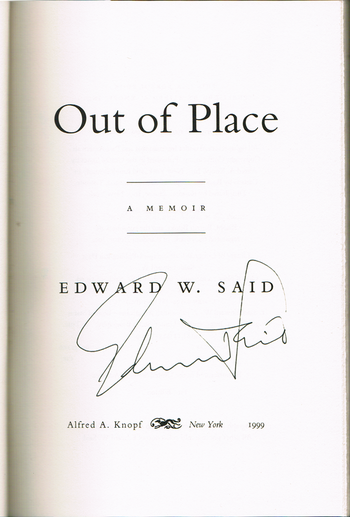Edward Said: Difference between revisions
Jump to navigation
Jump to search

imported>Christine Bush m (Removed stray punctuation mark.) |
imported>Christine Bush (Added image of Said's signature.) |
||
| Line 1: | Line 1: | ||
{{subpages}} | {{subpages}} | ||
{{Image|EdwardSaid signature.png|right|350px|Signature of Edward Said on the title page of his 1999 memoir, "Out of Place."}} | |||
'''Edward Wadie Said''' (last name pronounced ''sah-eed'') was the most-noted critic of the Western academic school of [[Orientalism]] who also authored the highly influential book entitled ''Orientalism''<ref>''Orientalism'' by Edward Said (1979) [http://www.worldcat.org/oclc/4831769 WorldCat]</ref> in 1979. The publication of this book is considered by many academics to have established the field of postcolonial studies. Said was of Palestinian birth and a Christian. Said was educated in British schools in Egypt, then at American prep schools and attended both Princeton and Harvard. He spent his entire academic career at [[Columbia University]] in New York City and was called by The New York Times "the most prominent advocate in the United States of the cause of Palestinian independence."<ref>''Edward W. Said, Polymath Scholar, Dies at 67'' [http://www.nytimes.com/2003/09/26/obituaries/26SAID.html NYTimes.com Archives]</ref> He died on Wednesday, September 24, 2003 at the age of 67. | '''Edward Wadie Said''' (last name pronounced ''sah-eed'') was the most-noted critic of the Western academic school of [[Orientalism]] who also authored the highly influential book entitled ''Orientalism''<ref>''Orientalism'' by Edward Said (1979) [http://www.worldcat.org/oclc/4831769 WorldCat]</ref> in 1979. The publication of this book is considered by many academics to have established the field of postcolonial studies. Said was of Palestinian birth and a Christian. Said was educated in British schools in Egypt, then at American prep schools and attended both Princeton and Harvard. He spent his entire academic career at [[Columbia University]] in New York City and was called by The New York Times "the most prominent advocate in the United States of the cause of Palestinian independence."<ref>''Edward W. Said, Polymath Scholar, Dies at 67'' [http://www.nytimes.com/2003/09/26/obituaries/26SAID.html NYTimes.com Archives]</ref> He died on Wednesday, September 24, 2003 at the age of 67. | ||
<references/> | <references/> | ||
Revision as of 13:24, 14 July 2014
Edward Wadie Said (last name pronounced sah-eed) was the most-noted critic of the Western academic school of Orientalism who also authored the highly influential book entitled Orientalism[1] in 1979. The publication of this book is considered by many academics to have established the field of postcolonial studies. Said was of Palestinian birth and a Christian. Said was educated in British schools in Egypt, then at American prep schools and attended both Princeton and Harvard. He spent his entire academic career at Columbia University in New York City and was called by The New York Times "the most prominent advocate in the United States of the cause of Palestinian independence."[2] He died on Wednesday, September 24, 2003 at the age of 67.
- ↑ Orientalism by Edward Said (1979) WorldCat
- ↑ Edward W. Said, Polymath Scholar, Dies at 67 NYTimes.com Archives
